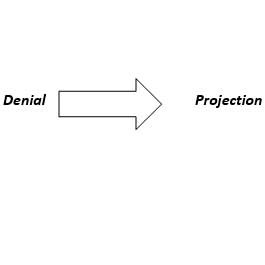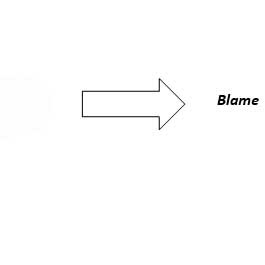In a previous blog, I talked about the power of “use of self” in coaching. This works well if a coach knows themselves really well! We need to know that “data” that shows up in the coaching room is not just some unprocessed “stuff” of ours that we are projecting onto someone else i.e. our coachee. And that sharing our noticing of this data will actually be helpful to our client.
One element that stems from Gestalt therapy is the concept of projection and how this impacts all of us in everyday life and how that might show up in coaching for ourselves and others.
If You Spot it; You got it.
Projection is a term derived from psychoanalysis, although it has now gone into everyday parlance, especially in personal and professional arenas. It is a fundamental element of what it is to be human with all our strengths and weaknesses and a major part of all our relationships, although it is something that is often hidden from our conscious awareness.
An example would be, I attribute to others the thoughts, feelings and meanings that I have disowned in myself. And/or believe I know what the other is thinking/feeling based upon previous experience with significant others. “I can tell by that look she is angry with me”.
In fact, even a baby has the ability to project its own feelings onto you in order to get its needs met. We can all recognise that a baby’s crying causes anxious feelings in us as a reflection of the baby's own state!
Projection can be said to be a set of feelings that I cannot own in the moment so “project” them onto others as if they were not a part of “me”.
The idea of “me” and “not me” (others) is central to the ideas of projection and how it works. It is very present focused so when it appears it is usually about what is going on in the dynamic between people at that very moment, although its basis may be historical. It is usually negative emotions that get projected onto someone else although sometimes things like grief can be projected elsewhere. The sequence is often as opposite.


The concept of who you believe the “me” to be (i.e. your identity) also has a part to play. We create a picture of ourselves (our values, beliefs, qualities, characteristics) and this self-identification process can selectively reject qualities and characteristics that fail to fit with the self-image we have created for ourselves.
If things appear that do not fit this image, then we automatically see them as lying elsewhere i.e. with others and “not me”. This gets validated daily as we go about our business in the world and becomes a strong sense of our “reality”. However, we are blind to this mechanism and may not even notice that we have ascribed to another, something we deem to be absent from us.
Whatever supports our identity will be seen as true and whatever has the potential to undermine that identity will trigger some kind of reaction. If that reaction is intense then it’s usually a sign that a life shifting issue is close to the surface and the person is doing their best (unconsciously) to divert attention away from something that could be a big paradigm shift for them (for good or bad). It’s just self-preservation!
Projection in action looks like:
- When I assume others think and operate on the same paradigm as I do
- When I mind-read and think I know what someone else is thinking
- When I am reactive and defensive
- When I blame others (putting others in the gutter)
- When I idealize and idolize (putting others on a pedestal)
- When I hold an agenda that others are supposed to follow
- When I impose my perspective on any situation and rigidly insist that this is the truth that the world operates by
- When I interact with people as if they were someone else, e.g. seeing one of your parents/bad bosses/old teacher in another relationship and relating to them accordingly.
Everything I see in the World is a Reflection of Me: Implications for Coaches
As coaches we need to be aware of our own projections as well as those of our clients.
As coach, we need to stay tuned into our projections (especially the old die-hard ones!) and watch how it informs our coaching. Supervision is a good place to explore when you notice blame, judgement, prejudice, self-justification, deference, and veneration. Mode 4 of the seven eyed model of supervision is linked to projection. Projection cannot be abolished and can be helpful in revealing people to themselves.
For clients, it is never about pointing out their projections – that certainly doesn’t work, but asking good questions that go to the heart of projection issues:
- What roles do you fulfil for others?
- What identity, status or expectation (baggage) do you project from these roles?
- How do these roles serve you? How do they empower you at the expense of others?
- Where do you feel in conflict with the roles you adopt in life?
- What do you habitually justify/defend/ take personally for yourself?
These questions are also equally appropriate for coaches to ask themselves too and whether, in relation to clients, there is any potential for answers to these to cause harm or to transform a coaching conversation.
“As a general rule if the focus is “them” and not ourselves, then we are likely projecting in some way”
– Aleka Thorvalson
If you are serious about taking your coaching skill to a more advanced level and would like to explore the impact of your own psychology on your work, then contact Julia initially for an informal chat about regularly reflecting on your practice with a trained supervisor.

